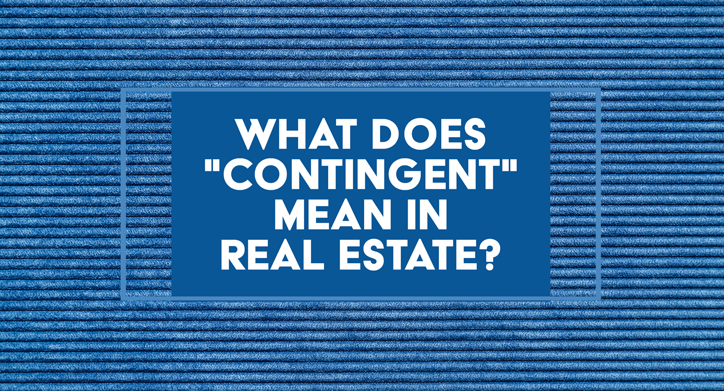Contingent is used to describe an offer that is dependent on the sale of another property. In other words, the buyer cannot move forward with the purchase until they have sold their current home. This term is often confused with “pending,” but there is a key difference. “Pending” refers to an offer that is currently under contract, while “contingent” describes an offer that is pending approval.
As an experienced real estate agent, knowing the terms and language involved in a real estate transaction is crucial for navigating deals effectively. One common term you’ve likely heard is “contingent.”
But what does contingent mean, and how does it differ from terms like “pending”?
Maybe you’re a seasoned professional or a new buyer or seller, regardless of that, it’s important to understand this critical aspect of real estate transactions.
What Does “Contingent” Mean in Real Estate?
The term “contingent” in real estate refers to an offer that depends on specific conditions being met before the deal can move forward.
Essentially, the purchase of a property is contingent upon certain events or requirements falling into place.
If these conditions are not satisfied, the buyer or seller may have the right to back out of the deal without penalty.
This contingent status acts as a form of protection for one or both parties during the negotiation process.
Types of Contingencies in Real Estate
There are several types of contingencies that can arise during a real estate transaction.
Each protects buyers and sellers in different ways. Here are the key ones you should know:
Home Sale Contingency
A home sale contingency is commonly used when a buyer needs to sell their existing property before they can complete the purchase of a new one.
For example, the buyer may agree to purchase a property at a set purchase price, but only if their current home sells within a specified timeframe.
If their existing home doesn’t sell, the deal can be terminated under the terms of this contingency.
Appraisal Contingency
An appraisal contingency ensures that the agreed-upon purchase price aligns with the appraised value of the property.
If the appraisal comes in lower than the purchase price, the buyer may renegotiate the deal, ask the seller to lower the price, or back out altogether without losing their earnest money.
Mortgage Contingency
The mortgage contingency, also known as a financing contingency, protects buyers by making the sale dependent on getting loan approval.
This allows buyers to back out if they are unable to secure financing within a specified period.

Title Contingency
A title contingency protects buyers by ensuring that the property has a clear title free of liens or claims.
If any issues with ownership rights arise, the buyer can withdraw from the deal until the title is resolved.
Contingent Status vs. Pending Status
Knowing the difference between contingent status and pending status is essential.
A property listed as contingent means there are ongoing contingencies—in other words, certain conditions still need to be met for the transaction to close.
On the other hand, a pending status indicates that contingencies have been resolved, and the deal is on track to close.
The Role of the Kick Out Clause
The kick out clause comes into play with contingencies like a home sale contingency.
It gives the seller the right to continue marketing their property and accept other offers while waiting for the buyer’s conditions to be met.
If another buyer makes a better, non-contingent offer, the original buyer has a set timeframe to remove their contingency or risk losing the property.
Why Contingencies Matter
Contingencies might seem like small details, but they’re foundational in almost every real estate transaction. They offer protections for buyers and sellers, ensuring that terms like purchase price, financing, and clear ownership are met before the deal is finalized.
If you’re addressing a mortgage contingency, title contingency, or dealing with a home sale contingency under a kick out clause, then knowing these terms enables you to advocate effectively for your clients. With a firm grasp of contingent status, you’ll be better prepared to guide buyers and sellers through successful transactions.
Contingencies may make the process feel more complex, but they ultimately ensure fairness and protect all parties involved. Navigate them well, and you’re one step closer to closing the deal.

Examples and Scenarios of Contingent Status
Over the years, I’ve seen countless real estate transactions, and no two deals are the same. Contingencies often play a major role in how things unfold. From buyers treading carefully with inspection contingencies to sellers juggling multiple offers, these scenarios can make or break a deal. I’ve learned firsthand how important it is to understand contingent status and all the moving parts involved. Here are some stories from my experience that highlight how contingencies work in real life.
The Surprise During the Home Inspection
I was helping a young couple searching for their first home, and they finally found one they loved. Their buyer’s offer included a standard inspection contingency, which allows them to walk away or renegotiate if the home inspection reveals major issues. Everything seemed perfect until the home inspector found something alarming—significant water damage in the basement.
The home seller hadn’t disclosed this issue, so my buyers were understandably upset. We had to revisit the real estate contract to explore their options. After some tough conversations, the seller agreed to cover the repair costs, and my clients decided to move forward. Scenarios like this really highlight how a contingency can serve as a safety net and protect buyers from unexpected surprises.
Purchase Price Contingency in Real Estate
The concept of a Purchase Price Contingency often comes into play when prospective buyers want added protection during a real estate transaction.
This contingency allows the buyer to renegotiate or back out of a deal if the property’s appraised value doesn’t align with the agreed purchase price. It’s one of the many common contingencies that protect buyers from overcommitting financially.
I’ve seen how this contingency can shape deals in both straightforward and complex ways. Here’s an example of how it works.
When the Deal Falls Through
There’s nothing more frustrating than watching a transaction fall apart right before the finish line. I remember a particularly tough situation where the buyer’s earnest money deposit was at stake. The deal was contingent on them securing financing, but their lender encountered an issue during the closing stages.
The specified date for finalizing the sale came and went. Despite everyone scrambling to find a solution, the deal failed, and the property went back on the market. Thankfully, the buyer’s financing contingency was in place, so they got their deposit back. But that moment reaffirmed how critical contingencies are—for both sides.

The Kick Out Clause in Action
Selling in a seller’s market can be a double-edged sword. I was working with a seller who’d accepted a contingent offer. The offer was dependent on the buyer selling their current home, so we added a kick out clause to the agreement. This meant my seller could continue to market the home and accept backup offers.
Sure enough, a second buyer came along with no contingencies to worry about. That put the original buyer in a tough spot—remove their home sale contingency or risk losing the property. They ended up withdrawing, and my seller moved forward with the second buyer. It wasn’t an easy process, but the kick out clause gave my client much-needed flexibility.
Multiple Contingencies Can Get Complicated
One of the more complex cases I’ve dealt with involved a buyer who wanted to include almost every type of contingency imaginable. They wanted an inspection contingency, a home inspection contingency, a title contingency, and a finance contingency, all packed into one purchase agreement.
Naturally, the seller was hesitant about accepting such a heavily contingent listing. They worried that the deal might not reach a closing date, given all the hurdles to clear. After plenty of back-and-forth, we managed to get both parties to agree on a timeline for clearing each contingency. The deal did close eventually, but it was a lesson in how multiple contingencies can drag out the process.
Contingent vs Pending Homes
One question I get all the time is about the difference between contingent and pending statuses. There’s a world of difference, and I’ve seen buyers get confused by it. A contingent status means there are still conditions to be met—contingencies like inspections or financing.
I once dealt with a couple interested in a contingent house, thinking it would be an easy deal to snag. But another buyer had already cleared the contingencies, moving the property to pending status, which essentially locked the deal in. This can happen quickly, so understanding these statuses is key to acting fast in today’s competitive market.
A Seller’s Perspective on Contingent Offers
I’ve often been asked, can a seller accept offers with contingencies? And the answer is, it depends on their situation. For example, one of my clients was eager to downsize and wanted a quick sale. They received an offer that was contingent on another buyer’s home selling, and they were concerned about waiting too long.
We included a contingency clause to set a clear deadline, giving the buyer a specific timeframe to fulfill their conditions. That timeframe worked out, and the transaction was smooth. But it’s not always that simple. Sellers often need to weigh the risks of waiting for contingencies to clear, especially in competitive markets.
The Role of Contingency Clauses
Contingency clauses can make or break deals. One scenario I’ll never forget involved a buyer waiting on a title search to verify clear ownership. It turned out the property had a lien that was overlooked—something the seller’s lender hadn’t disclosed. Because of a well-written contingency clause, my buyer was able to walk away with their earnest money deposit intact.

Real Estate Agent Industry Terms
What I’ve learned after years in real estate is that contingencies exist for a reason. They’re not just legal jargon in real estate contracts; they’re tools that protect home buyers and sellers alike. From ensuring a smooth closing date to handling a pending deal, contingencies play a crucial role in every transaction.
These stories are just a glimpse into how nuanced contingencies can be. Taking the time to understand them can save you from headaches and keep deals moving forward—even with unexpected bumps along the way.
As you can see, there is a big difference between contingent and pending when it comes to real estate. It is important to understand these terms before making an offer on a property. Now that you know the meaning of contingent, stay tuned for more blog posts about other real
If you’re confused about any of the terms in this blog post, be sure to reach out to a real estate professional for clarification. Now that you know what contingent means, stay tuned for more helpful blog posts about real estate! Thanks for reading.



